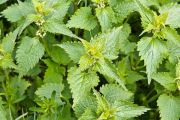Keeping Weeds Down

Weeds, so the saying goes, are just plants in the wrong place. The trouble is, there are so many of them. However much you might think dandelions are pretty, or ground elder has elegant leaves, if you stop to admire them too long you (and your plants) will quickly be overrun.
You'll probably never be completely free of weeds, but it's quite possible to keep them well under control. In our Chislehurst, Newchurch, Canterbury, Welling and Newport garden centre you'll find all you need from weedkillers for persistent thugs, to garden hoes to deal with tiny annual weed seedlings before they get their heads too far above ground.
For a really effective anti-weed strategy, tailor your approach to the weed you're tackling: here's how.
- Annual weeds: the easiest to tackle as long as you have a routine. Every week without fail, whether it looks like it needs it or not, use a Dutch hoe to slice through emerging seedlings just below the surface.
- Deep-rooted dandelions and docks: these can regenerate from the tip of the root left in the ground, so dig down deep enough to get the whole thing out, or spot-treat with a glyphosate-based weedkiller.
- Smothering bindweed: The twining stems of bindweed are a menace in the garden, strangling your plants and smothering everything, Hand-weeding rarely controls it properly: in our garden centre you'll find hand-held glyphosate gel weedkiller treatments to paint on the leaves without endangering nearby plants.
- Persistent ground elder and couch grass: These won't kill your plants but they do compete with them for water and nutrients. Their long, brittle roots mean they often survive digging out by hand. Spray with glyphosate-based weedkiller, or keep them out with thick weed-control fabric, available in our garden centre.
- Thuggish brambles: Often a problem on neglected ground, brambles colonise large areas by arching stems which root where they touch the ground. Don a thick pair of gauntlets and wade in with loppers to cut them back, then dig out rootstocks one by one, or paint the stumps with a brushkiller treatment like SBK.
Controlling weeds by mulching
Mulching (putting a layer of compost, bark, gravel or other material) on the soil suppresses weeds by blocking light from the seeds, stopping them from germinating. Mulching with organic matter like compost is also great for the soil, improving its structure. Mulch flower beds annually, using a 5cm (2in) layer of compost or well-rotted garden manure. Bark chips make a good mulch around shrubs.
How to get rid of difficult weeds
Many weeds can be dug up using a hand fork, but perennial weeds like dandelions, bindweed and ground elder will grow back from any root segments left in the ground, making them difficult to get rid of. Bindweed and ground elder are particularly hard to control because they produce extensive networks of underground roots. Regular hand weeding will weaken them eventually, but ensure you remove as much of the roots as possible. Use a dandelion grubber, which has a long narrow blade, to dig up dandelions.
Difficult perennial weeds can also be killed using a systemic weedkiller containing glyphosate. Systemic weedkillers are absorbed through a plant’s leaves and work their way through the whole plant, killing it right down to the roots. When spraying systemic weedkillers, protect surrounding plants by covering them with plastic sheeting, as the weedkiller will kill any plant it comes into contact with. Always follow the manufacturer’s instructions when using weedkiller.
Weeds that are good for wildlife
Weeds do have some benefits, especially for garden wildlife:
-
Dandelion flowers are one of the top food sources for bees early in the year before most other plants are in flower.
-
Dandelion seedheads provide food for small birds like goldfinches and blackbirds.
-
Flowering weeds like daisies, buttercups and clover are good for bees and hoverflies.
-
Nettles provide food for the larvae of many moths and butterflies, including tortoiseshells and peacocks.
If your garden is big enough, it’s worth leaving a few weeds to grow in an unused patch to help support your local wildlife.
Please ask the staff in our garden centre in Chislehurst, Newchurch, Canterbury, Welling and Newport for more information and advice about dealing with weeds in your garden.
Shop Weedkillers Online
